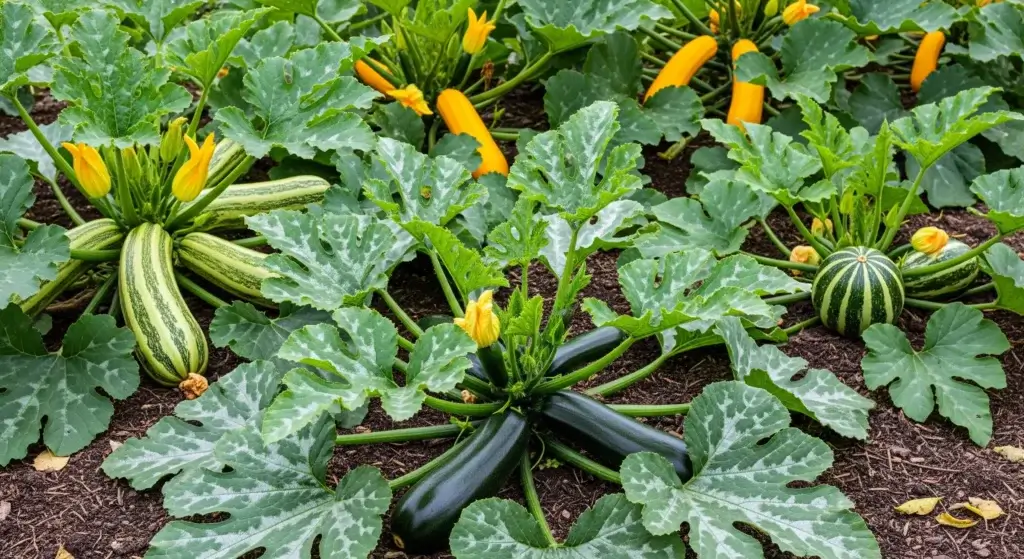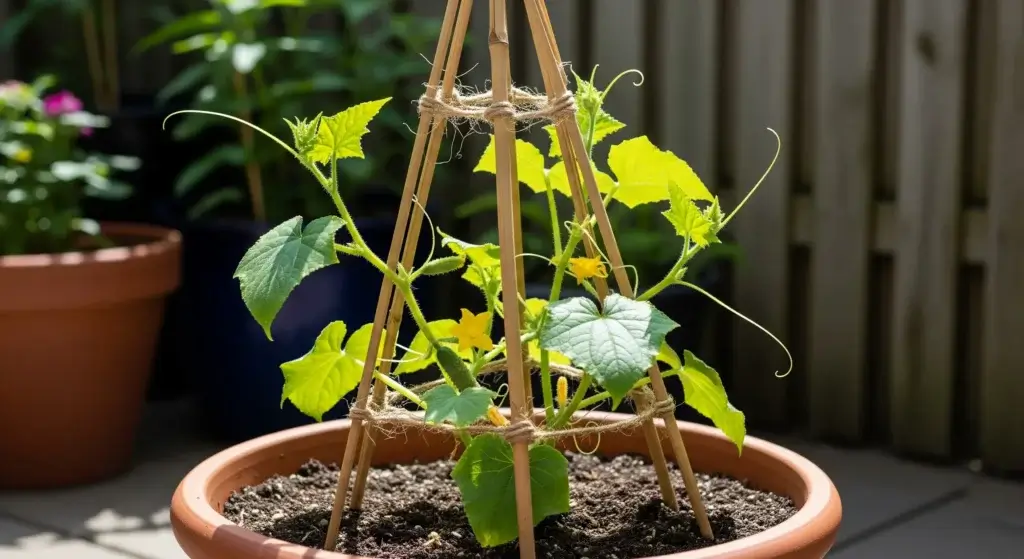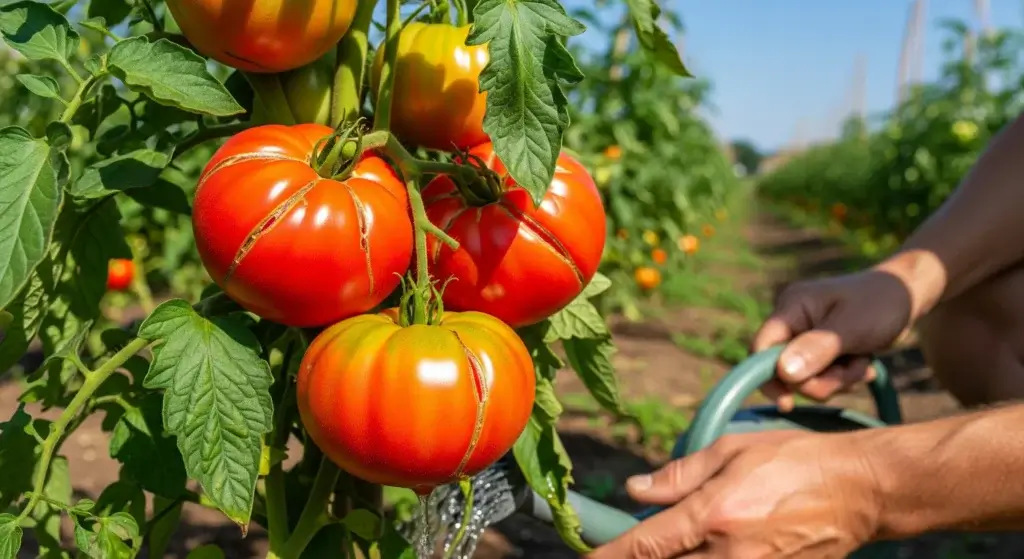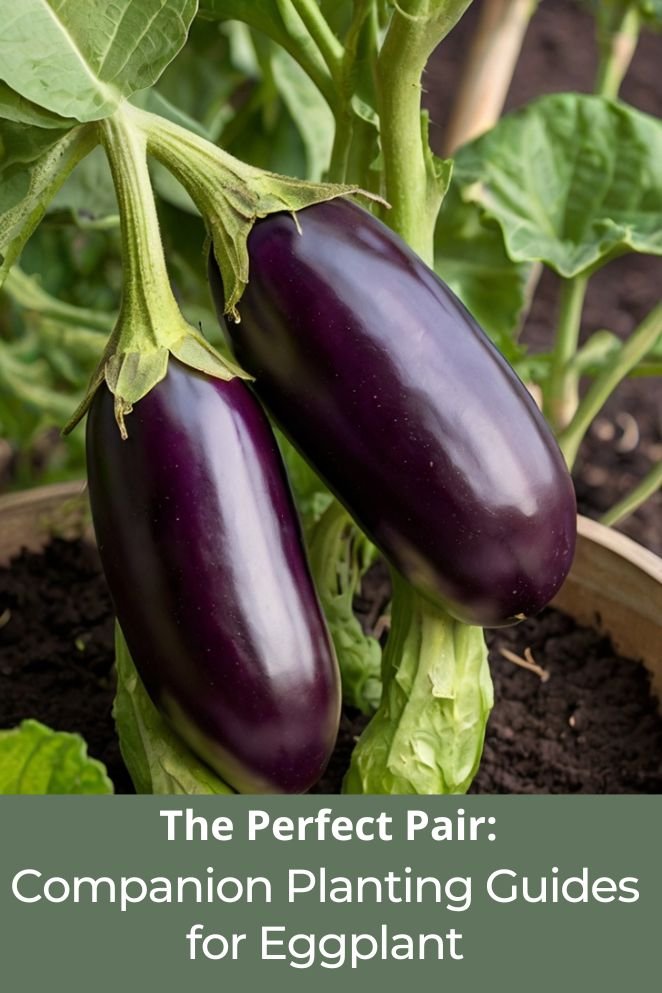
Companion planting is an age-old gardening practice that not only enhances the growth of your plants but also helps manage pests and attract beneficial insects without relying heavily on chemicals or synthetic fertilizers.
Eggplants like many plants, they thrive when paired with the right companions.
By strategically pairing plants together, you can create a more balanced ecosystem that benefits all your crops.
What is Companion Planting
Companion planting is the practice of growing different plants together to benefit one another.
Certain plants can provide nutrients, shade, or protection from pests, while others might attract pollinators or beneficial insects that help keep your garden healthy.
The idea behind companion planting is simple: certain plants have natural properties that help others grow stronger or fight off common problems like pests or diseases.
When done right, this method reduces the need for pesticides, increases crop yields, and creates a more diverse and resilient garden.
Eggplant Companion Plants
Eggplant companion plants to improve growth
Companion planting is a great way to help your eggplants grow stronger and healthier by using nearby plants to improve the soil, protect them from pests, or create a better growing environment.
Here’s how some specific plants can boost eggplant growth:
Peas
Peas are part of the legume family, which means they have the special ability to fix nitrogen in the soil.
Nitrogen is a crucial nutrient for eggplants, helping them develop sturdy stems and plenty of leaves.
In addition, peas can offer some shade to the soil, which reduces water loss and keeps moisture levels stable—something eggplants need to avoid stress.
Garlic
Garlic is known for its ability to enrich the soil.
It breaks down into organic matter that releases nutrients like nitrogen, phosphorus, and potassium.
These are essential for eggplants to grow well and produce high-quality fruit. Plus, garlic can even help keep pests away due to its strong smell.
Hairy vetch
This cover crop is often used to improve soil health.
If you plant hairy vetch before eggplants and leave it as mulch, it can naturally boost the availability of nutrients in the soil.
Not only does it improve the overall quality of the fruit, but it also increases your eggplant yield by creating a nutrient-rich environment for the seedlings.
Spinach and lettuce
These fast-growing, leafy greens can be planted around your eggplants to act as living mulch.
They help shade the soil, keeping it cooler and retaining moisture—an important factor for eggplants, which need consistent soil moisture to prevent stress and problems like blossom end rot.
By planting spinach or lettuce near your eggplants, you create a more stable, moisture-friendly environment for your crop.
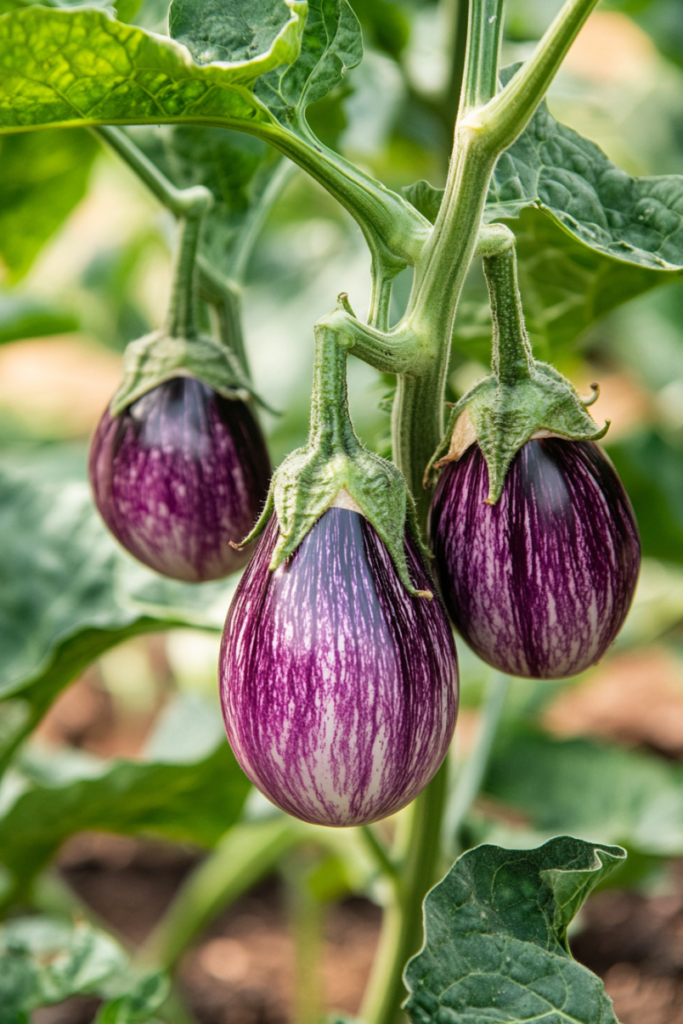
Eggplant companion plants to attract beneficial insects
Attracting beneficial insects to your garden is one of the smartest ways to naturally control pests and improve pollination.
Here are some plants that will attract helpful bugs to your eggplants:
Beans
Beans are not just a tasty addition to your garden; they’re also great for attracting beneficial insects.
The flower structure of beans, such as snapdragons and peas, is particularly appealing to bumblebees.
These bees are fantastic pollinators, especially for solanaceous plants like eggplants, tomatoes, and peppers.
By planting beans near your eggplants, you can boost pollination, which can lead to better fruit production.
Dill
Dill isn’t just a culinary herb; it’s also a magnet for beneficial insects.
Its delicate flowers attract a variety of insects that prey on common pests like caterpillars and aphids.
By having dill in your garden, you can encourage these helpful bugs to take residence near your eggplants, providing natural pest control while improving pollination as well.
Lavender
The sweet scent of lavender does more than just smell nice—it also attracts pollinators like bees and butterflies.
By planting lavender next to your eggplants, you can enhance their pollination, potentially increasing your overall harvest.
Lavender also acts as a natural repellent for pests like moths and fleas, helping to protect your eggplants from harm.
Eggplant companion plants to control pests
Certain companion plants can help you control common eggplant pests, naturally reducing the need for chemical pesticides. Here are a few options:
Nasturtiums
Nasturtiums are vibrant flowers that serve as a trap crop.
They attract pests like aphids and flea beetles away from your eggplants.
By luring these pests to the nasturtiums instead, your eggplants remain safe from damage, allowing them to grow healthily.
Basil
Not only is basil delicious, but it’s also an effective pest deterrent.
It can repel common pests such as aphids, whiteflies, and mosquitoes.
Plus, when basil is planted near eggplants, it can even enhance their flavor, providing a double benefit for your garden.
Catnip
Known for its ability to repel unwanted insects, catnip is a great companion plant for eggplants.
It effectively keeps aphids, flea beetles, and ants away, providing protection without competing for nutrients.
Additionally, catnip is easy to care for, making it a low-maintenance choice for your garden.
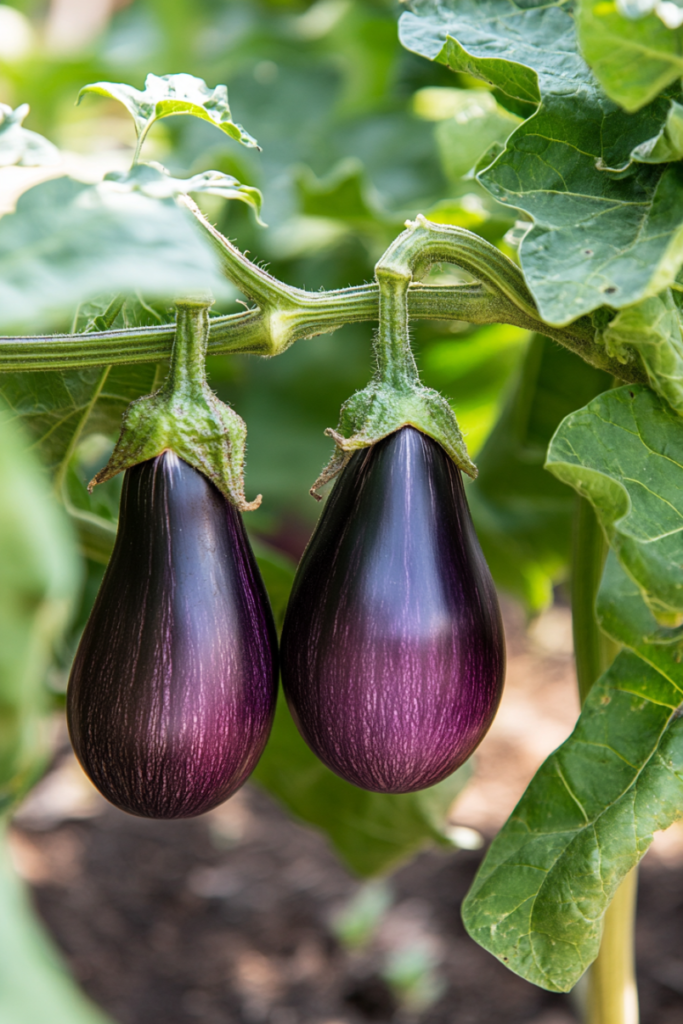
What Not to Plant Near Eggplants
While companion planting can be incredibly beneficial, not all plants get along well with eggplants.
Certain plants can compete for nutrients or attract pests that could harm your eggplants.
Here’s what you should avoid planting near eggplants:
Fennel
Fennel is notorious for inhibiting the growth of many plants, including eggplants.
It releases compounds into the soil that can stunt the growth of nearby plants, a process known as allelopathy.
These compounds can interfere with the development of eggplants, making fennel one of the worst companion plants for your garden.
Corn
Both corn and eggplants are heavy feeders, meaning they require a lot of nutrients from the soil to grow well.
If they are planted too close together, they will compete for essential nutrients like nitrogen, phosphorus, and potassium.
Additionally, corn grows tall and may cast too much shade on eggplants, which need full sunlight to thrive.
Melons
Like corn, melons are also heavy feeders.
Planting melons near your eggplants can result in competition for nutrients, leading to slower growth and a lower yield for both plants.
Since both crops demand a lot from the soil, they can quickly deplete nutrients, leaving each other weaker.
Pumpkins
Pumpkins and eggplants have similar nutrient needs.
Planting them close to each other can lead to competition for soil resources, causing stunted growth for both crops.
Additionally, pumpkins can spread out and take up a lot of space, which may crowd your eggplants.
Zucchini
Zucchini plants grow large and can create a dense canopy of leaves that shades neighboring plants.
Eggplants need plenty of sunlight, so having a large zucchini plant nearby can block the light they need for proper growth.
This can lead to poor fruit development and lower yields for your eggplants.
Geraniums
While geraniums are beautiful flowers, they can carry diseases that affect eggplants, such as blight.
Blight is a fungal disease that can weaken or kill your eggplants.
To avoid this, it’s best to keep geraniums away from your eggplant patch to reduce the risk of disease spreading.
Brassicas (cabbage family)
Plants from the cabbage family, such as cabbage, broccoli, and cauliflower, are also heavy feeders.
Like corn and melons, brassicas can drain the soil of nutrients that eggplants need to thrive.
In addition, brassicas attract pests like cabbage worms and aphids, which can increase the pest pressure on your eggplants.
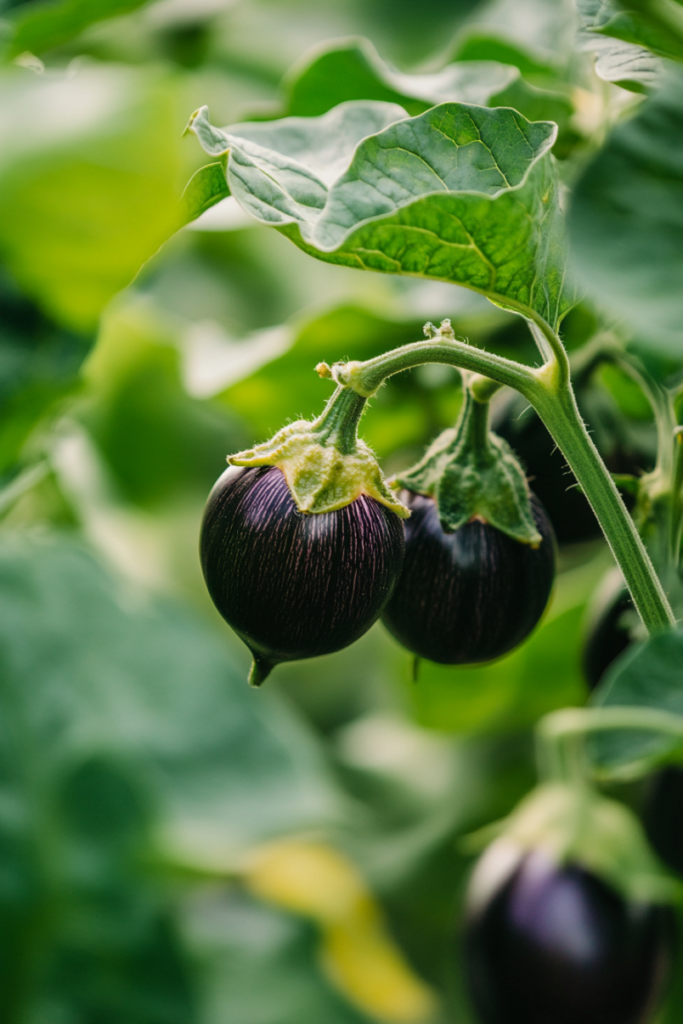
Other nightshades
Eggplants belong to the nightshade family, which also includes tomatoes, peppers, and potatoes.
While some gardeners do plant tomatoes or peppers near eggplants, it’s important to be cautious.
All nightshades are prone to similar pests, such as aphids and the dreaded Colorado potato beetle.
If one plant becomes infested, nearby nightshades can easily become affected, leading to widespread damage.
So, while it’s not an absolute rule to avoid other nightshades, be mindful of pest issues.
Conclusion
Companion planting is a powerful tool for improving the health and productivity of your eggplants.
By selecting the right plants to grow alongside your eggplants, you can enhance their growth, attract beneficial insects, and keep pests under control.
While there are many excellent companion plants to choose from, it’s also important to avoid planting certain crops that may compete with or harm your eggplants.
With a little planning and the right companion plants, your eggplants will thrive, yielding healthy, delicious fruit for you to enjoy all season long.

